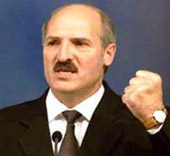President of Belarus, Alexander Lukashenko, becomes Europe's 'bad guy No.1'
President Lukashenko has won popularity for his ability to act differently

Despite recent tragic events in London, the European Parliament found some time to discuss problems connected with the republic of Belarus. Deputies called upon the European Committee and governments of EU states to toughen sanctions against Belarus for severe violations of freedom of speech in the republic. It was particularly suggested the EU should freeze all contacts with the government of Belarus. 
European parliamentarians harshly criticized illegal arrests in the republic, poor treatment of prisoners, attacks against media outlets and politically motivated persecutions in the country. The statement, which was approved as a result of the discussion, contained an appeal to put several high-ranking officials of Belarus on the black list of citizens, which will be denied visas to enter the territories of European Union members. In addition, deputies said that independent Belarussian journalists should be rendered financial and organizational assistance.
The story started at the end of 2002, when the government of the Czech Republic denied Belarussian President, Alexander Lukashenko, a visa. Mr. Lukashenko was expected to participate in the meeting of NATO leaders. The European Commission and members of the European Union introduced restricted sanctions against Belarus last year, froze all contacts on the top level and excluded Belarus from the European neighborly relations plan. George W. Bush said in February of the current year, prior to the Putin-Bush summit in Bratislava, that “wind of freedom” would start blowing in Belarus soon. US Secretary of State, Condoleezza Rice, stated during her visit to Vilnius, Lithuania, that the US administration would render financial help to the Belarussian opposition.
As soon as Serbian President Slobodan Milosevic was removed from power in Serbia, Alexander Lukashenko immediately became Europe's “bad guy” number one. Indeed, the President of Belarus became the only politician, who has never attempted to join European organizations. Lukashenko has not canceled death penalty in Belarus, which awarded him the persona non grata status in the Council of Europe. Moreover, Alexander Lukashenko successively closed subsidiaries of Western charity and public organizations in Belarus. He publicly stated that NATO was a criminal organization. More importantly, foreign politicians accuse Mr. Lukashenko of destroying the Unified State with Putin-presided “authoritarian” Russia.
Western states increased their pressure on Belarus after several post-Soviet countries experienced “color revolutions.” European states have been trying to create a so-called sanitary cordon around Russia for 100 years already. Belarus is the only obstacle left on the way. President of Georgia, Mikhail Saakashvili, stated that Belarus needed to take a turn for the West, for “it deserved something better.”
It is noteworthy, though, that Western countries may suffer from their own anti-Belarussias attacks. A gas cost conflict occurred between Russia and Belarus in the beginning of 2004, when Russia's giant Gazprom restricted gas supplies via the territory of Belarus. The European Union witnessed the consequences of the economic conflict immediately. Poland and Lithuania found their gas storing facilities empty; Germany and the Czech Republic suffered a gas crisis as well. Lukashenko could cut the transit supplies of natural gas at any moment. Belarus has already taken revenge on Georgia for the remark of the Georgian president and introduced the visa-entry regime with the post-Soviet republic.
President Lukashenko has won popularity for his ability to act differently. There are no oligarchs in Belarus, although this class exists in the Russian society for more than a decade already. Belarussian authorities do not struggle with the Russian language, as it happens in the neighboring Ukraine.
In spite of certain advantages, Belarus has to face numerous problems anyway. The Belarussian television is like a never-ending report from agricultural fields. The living standard is quite low in Belarus: the local population has to listen to numerous stories about successes achieved in the nation's economy, although they can see quite opposite things when they look out of their windows, for example. To crown it all, the absence of different points of view in Belarus might eventually become a very annoying factor for the republic's population. The people want to live well, like in the neighboring Lithuania and Poland.
The government of Belarus will have to get ready for a very serious informational war and pay first priority attention to double standards in statements from European and American politicians. At the end of the day, the situation with freedom of speech is far from being perfect in Georgia and Moldavia, not to mention human rights infringements inside the EU, in the post-Soviet state of Latvia, first and foremost.
One may thus infer that the resolution of the European Parliament has a goal to show Belarussian President Lukashenko his place for his unwillingness to march along with Europe. European deputies use freedom of speech issues as a cover only.
Vadim Trukhachev
Subscribe to Pravda.Ru Telegram channel, Facebook, RSS!

